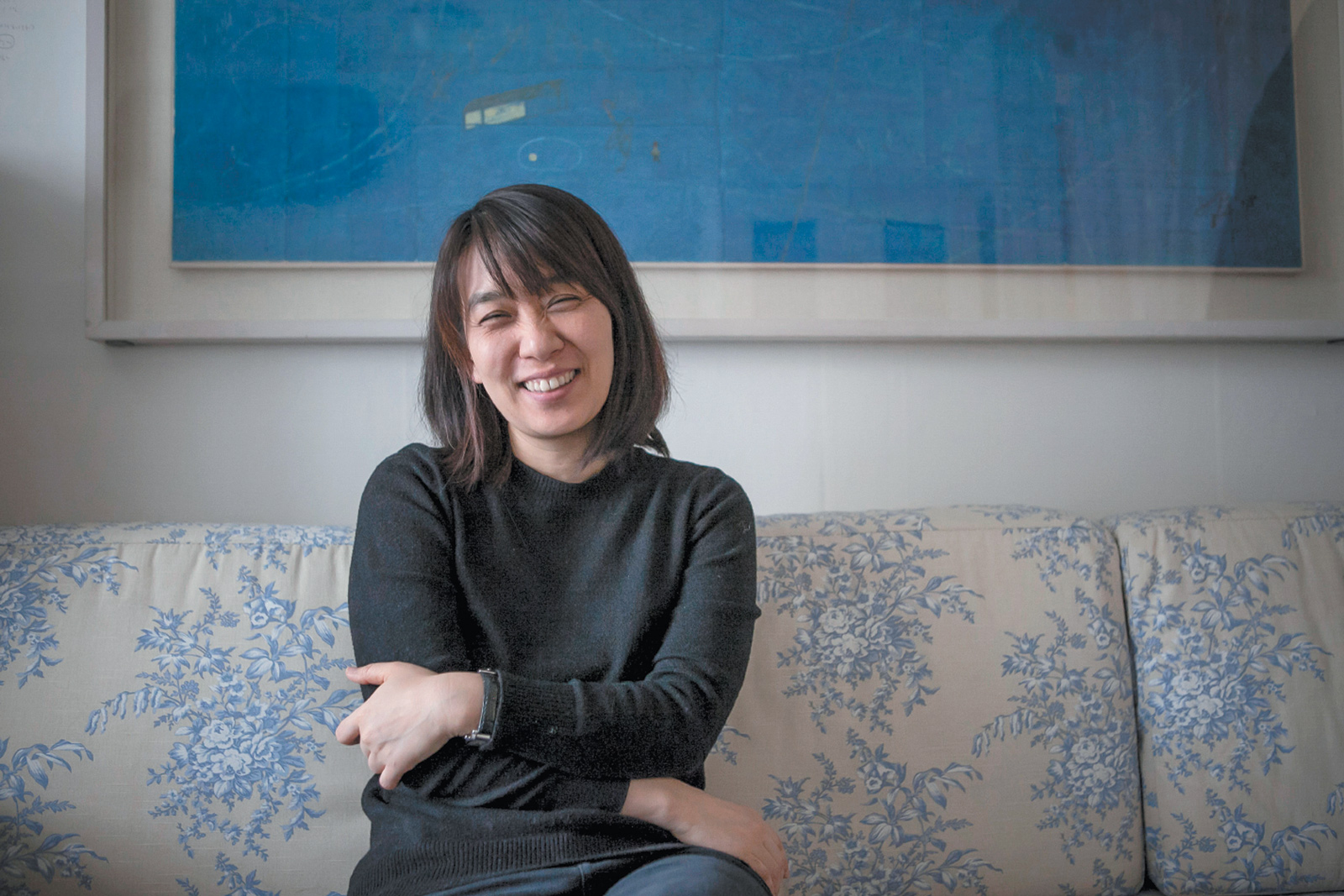This year the prestigious English Man Booker International Prize was given to the Korean writer Han Kang for The Vegetarian, a short, absorbing novel that readers and reviewers have declared to be about—besides meat-eating—marriage, obedience, care- giving, adultery, art, human violence, post-human fantasy, taboos, the resolution of the desperate, “the crushing pressure of Korean etiquette,” and much more. One of the glories of novels is that their complexity allows for different interpretations, and perhaps this partly explains The Vegetarian’s appeal for judges specialized in literature and translation from various language traditions and with, no doubt, different preoccupations.
There are metaphorical constructs so flexible and capacious as to allow for all of these meanings; generally, the more terse and minimalist a narrative, the more adaptable its metaphorical repertory to a wide range. The story of The Vegetarian, stripped of its allegorical resonance, is simple enough: three related sections, originally published separately, connect members of the Kim family. The narrator of section 1, Mr. Cheong, an ordinary salary man, is the husband of Yeong-hye Kim, who announces to him that she has become a vegetarian, a decision that is met by an unusual amount of rage from him and other family members, and sets off a series of strange events involving the wife’s sister In-hye, her husband, and their parents.
At first, Mr. Cheong accommodates his wife’s new diet, but their marriage is affected. She thinks he stinks of meat; he comes to desire In-hye, because Yeong-hye has gotten rather skinny with her vegetarian regime and, much worse, is mutely defiant about it. She provokes a big family row that ends with her father slapping her when she refuses to eat meat, which in turn prompts her to slash her wrist.
Alternating with the husband’s narrative are italicized interior monologues by Yeong-hye herself, generated, it seems, by her horror of blood, meat, the murder of animals, a certain dream she had. “Dreams of my hands around someone’s throat, throttling them, grabbing the swinging ends of their long hair and hacking it all off, sticking my finger into their slippery eyeball.” In one of these sections, Yeong-hye remembers a harrowing episode from childhood when they tied their dog behind their car, ran him to death, and then ate him. One repellent memory, bizarre response, and unexplained emotion after another leads us to the mystified conclusion that this novel is not about vegetarianism or, really, about these mute, shadowy puppet characters. But what is it about?
Section 2 is told from the point of view of Yeong-hye’s brother-in-law, husband of her sister In-hye. He is an artist and filmmaker, with whom Yeong-hye will have an erotic idyll: like Mr. Cheong to In-hye, he too is attracted to his sister-in-law—Yeong-hye—and asks her to model for him. He paints her body with flowers, and films her making love with J., a young man whom he also decorates and convinces to appear in the film, which attempts to fuse their bodies into botanical patterns. Then the filmmaker has himself painted, and he and Yeong-hye make love:
His red flower closed and opened repeatedly above her Mongolian mark [birthmark], his penis slipping in and out of her like a huge pistil.
Less botanically minded than he, his wife In-hye discovers the adulterous liaison, concludes they are both mentally ill, and calls emergency services.
Section 3 is written from the point of view of In-hye. Three years have passed. Gradually it has become clear that Yeong-hye is indeed mentally ill and she is now in an institution, where she is trying to become a tree. In-hye dreams of her sister, and seems to hear her thoughts:
I’m doing a handstand, leaves are growing out of my body, roots are sprouting out of my hands…they delve down into the earth…. I spread my legs because I wanted flowers to bloom from my crotch, I spread them wide…
Because Yeong-hye has run away from the institution, In-hye has been asked to come help deal with her. In-hye too is in despair. Her husband has left her, and Yeong-hye seems near death from anorexia, protest, and the process of turning into a vegetable: “I don’t need to eat, not now. I can live without it. All I need is sunlight.” The mental hospital force-feeds her after she refuses to eat. In-hye tries to reason with her: “Do you really think you’ve turned into a tree? How could a plant talk? How can you think these things?” Yeong-hye begs In-hye to take her away, and in the end the two flee in an ambulance. In a very overwrought state, In-hye reflects on her husband’s infidelity, her own deficiencies as a mother, and other anguishing experiences of daily life.
Advertisement
There are some incidental characters: the sisters’ parents; In-hye and her husband have a little boy, Ji-Woo; Mr. Cheong’s boss and his wife; J., the young man; and a few people at the mental institution. Sometimes, in scenes with these people, the narrative approaches the more conventionally naturalistic, as in a scene in Section 1 when Mr. Cheong and Yeong-hye have dinner with his boss and his wife—a classic situation often depicted in comic films and TV. Here it’s a source of embarrassment and shame to the husband, caused by Yeong-hye’s refusal to wear a bra:
To my utter mortification I saw that the outline of her nipples was clearly visible through the fabric. Without a doubt she’d come out without a bra. When the other guests surreptitiously craned their necks, no doubt wanting to be sure that they really were seeing what they thought they were, the eyes of the executive director’s wife met mine. Feigning composure, I registered the curiosity, astonishment, and contempt that were revealed in turn in her eyes.
What might seem to us an overreaction to nipple outlines by the husband and by the other guests is one of a number of almost inadvertent glimpses into the peculiarities of Korean culture, and it isn’t clear that the writer intends them ironically, as criticism, or that she means to convey quite what we actually do infer about Korean puritanism and conformism, even allowing for her intention to present the husband as conventional and insecure, and the boss and wife as prudish and censorious. A number of these aperçus seem incidental to the author’s intention but confer the strangeness we experience in reading the novel.
What accounts for the enthusiasm but also the slight feeling of nostalgia we get from the austere harshness of The Vegetarian? Early-twentieth-century fiction was often written in the same register, and was sometimes referred to as “existentialist,” with only a few distinguished examples read much today—think of Jean-Paul Sartre’s Nausea or Alain Robbe-Grillet’s Jalousie. Nigel Dennis’s A House in Order (1966) also comes to mind, with its vegetable theme. In that seemingly simple fable, a nameless man in an occupied land, hiding in a greenhouse, proceeds to bring its desiccated plants to life while shadowed by the presence of enemy forces, the approach of the conquerors. One can think of the novel as being about courage, persistence, life force, futility, defiance—abstractions rather than particular histories of real fictional people. In this way, In-hye, Yeong-hye, the husbands of In-hye and others do not seem like “real” characters, though reality is conferred on Mr. Cheong by virtue of his first-person voice.
The language of The Vegetarian is terse in the Iowa modernist fashion, and sometimes contains sentences like “she thrust her glittering golden breasts over the veranda railing,” which raise questions about the translation if not the writing itself. The novelist Tim Parks has an interesting discussion of the novel online in the NYR Daily, in which he is very critical of the language of the English version and focuses on the difficulties of judging translations of unfamiliar languages.* One can extend his observations to include unfamiliar cultures too, whose mysteries prevent us from really judging a narrative with the conventional tests we consciously or unconsciously apply to fiction: probability, realism, suspense, mode of melodrama, satire, romanticism, and so on.
What explains the violence of Yeong-hye’s rejection of meat, or her husband’s mysteriously strong rage, and his need to explain it plausibly to his boss, as though it were a terrible aberration? Is it Yeong-hye’s willfulness that enrages her husband and causes her father to slap her face? And there’s the peculiar, violent sex in Section 2, and the long passages of panic and resistance experienced by In-hye outside the mental institution:
A feeling of déjà vu crept up on her then, a feeling of having already experienced this same moment countless times. The proof of her internal pain had been set in front of her as though this were something she’d spent a long time preparing for….
The reader is left wondering: Is this a fable about male domination, personal autonomy, Korean attitudes about meat-eating, marriage? And is it just about these individuals in particular or an entire society? One can see that the conceit of body paint has a dim connection with the Korean fascination with altering one’s appearance: by some estimates, a third or more of Korean women have undergone some sort of plastic surgery, even if just to the eyelids.
All three sections are suffused with the rhetoric of invasion—people are stabbed, injected, painted, fucked, invaded with a camera, their wrists cut, tubes inserted: “The middle-aged male doctor then pushed a cold abdominal scope deep into her vagina and removed a tongue-like polyp….” “She would all of a sudden find herself wanting to stab herself in the eyes with her chopsticks….” It’s worth noting that Korea leads the world in suicides, or comes second, depending on whom you read. Often when a character goes mad in a literary work, the madness is intended as a comment on society’s condition—going mad as an essentially sane act. Does that explain Yeong-hye’s desire for metamorphosis, like Daphne, into a tree?
Advertisement
The name in Korean for all this seemingly random, intense emotion of protest, I gather, is han, just like the name of the author. Han is a sort of unique Korean national trait or spiritual condition—a characteristic rage against other people, enemies of the nation, or even history itself. It is described as Korea’s alone, as if it were in their DNA. One Korean writer, Euny Hong in The Birth of Korean Cool: How One Nation Is Conquering the World Through Pop Culture (2014), describes it as “a culturally specific ultra-distilled form of rage” arising “from the fact that the universe can never pay off this debt [of unfair treatment of Koreans], not ever.” This produces a certain collective malice. The popular Korean national folk song, used by both North and South Korea for ceremonial occasions, begins: “Ye who hast tossed me aside and left me, I hope you get a foot disease before you have traveled ten li.”
Is vegetarianism a han-provoking crime in South Korea? Or are the crimes deviation and nonconformity? (It’s also possible that this novel is really just an argument for vegetarianism.) Do the Kim sisters suffer from the han disease hwa-byong—anger illness—which produces symptoms rather like theirs of dyspnea, dizziness, and stomach and bowel upsets? “A strange pain gripped her chest. It was an oppressive, constricting feeling, as if the walls of the house were slowly closing in…. The pain feels like a hole swallowing her up, a source of intense fear and yet, at the same time, a strange, quiet peace.”
The statistics about Korean plastic surgery and suicide seem to bear on our understanding of the themes of metamorphosis and self-destruction in this novel, and of han. Are we in America developing a form of han of our own? You can’t help but wonder if creeping han counted in the Brexit vote too. In the Trump voter? Spreading worldwide today? With her chilling fable, Han Kang effectively puts us on our guard.
-
*
“Raw and Cooked,” NYR Daily, June 20, 2016. ↩




